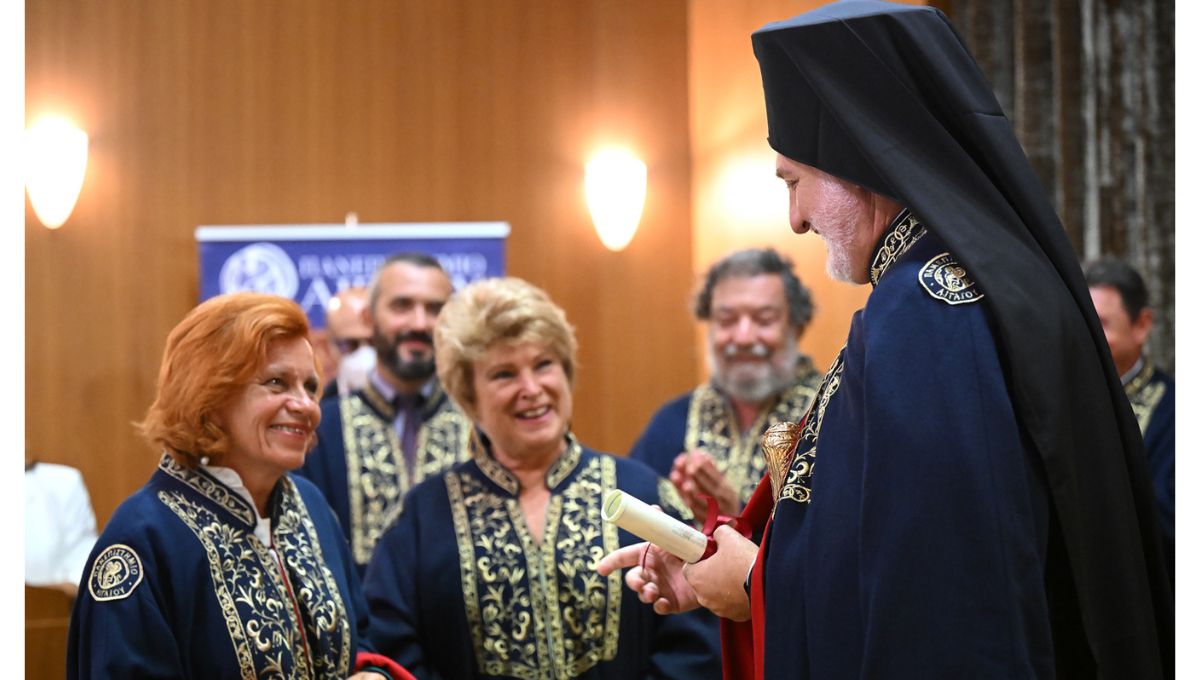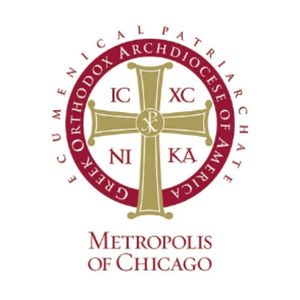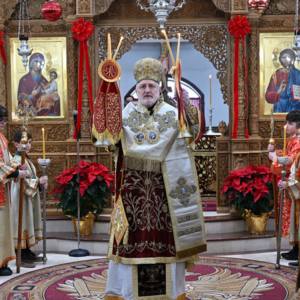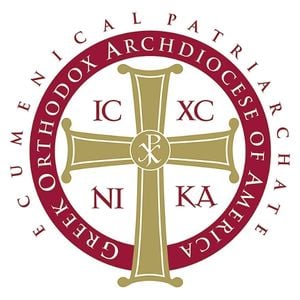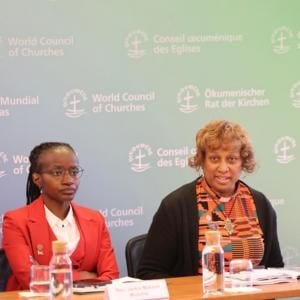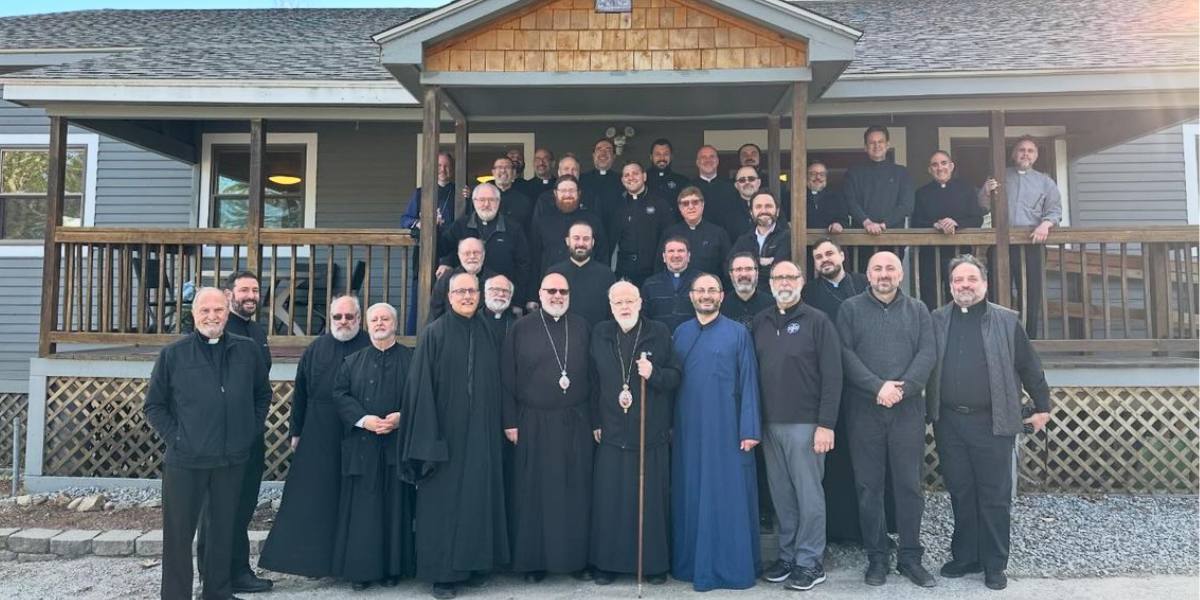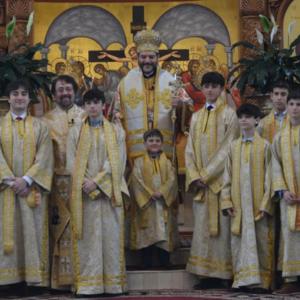Archbishop Awarded Honorary Doctorate
Chios— The University of the Aegean awarded Archbishop Elpidophoros of America an honorary doctorate on Monday, September 5, 2022 at their campus in Chios. In his academic address entitled, "Crisis Management in the Ecumenical Patriarchate," His Eminence discussed the historic role of the Ecumenical Patriarchate of Constantinople in responding to crises on both a global scale, as well as within ecclesial institutions.
In his two-part address, the Archbishop first highlighted the most contemporary involvement of the Ecumenical Patriarchate--and particularly that of His All-Holiness Ecumenical Patriarch Bartholomew--in responding to worldwide crises. This included his role in COVID-19 encouraging vaccination and masking, especially in the face of widespread misinformation attempts aimed at demonizing efforts to fight the pandemic, as well as his prophetic role in the global ecological crisis that earned him the title of the Green Patriarch. The Archbishop also discussed how Patriarch Bartholomew successfully handled the most recent disaster where a fire destroyed the Baloukli nursing home in Istanbul just last month.
In the second part of his address, the Archbishop narrowed the lens to discuss how the Ecumenical Patriarchate functions as a crisis manager within the ecclesial domain, especially in its special role as coordinator of global Orthodox Christianity. In this portion, which focused on historical methodologies and canon law, His Eminence traced successive moments in church history that demonstrated how the first throne of the Orthodox Church used its appellate function--an exclusive canonical privilege afforded by the Holy Tradition and Sacred Canons to the Ecumenical Throne. Unpacking this aspect of both church history and church law, Archbishop Elpidophoros explained:
“The sacred canons recognize both the geographical jurisdiction of the Ecumenical Patriarchate and its jurisdiction beyond the circumscribed geographical boundaries of the Orthodox Churches in its exclusive appellate function to resolve conflict between clergy and other Orthodox jurisdictions. The mighty corpus of the sacred canons, in conjunction with Holy Tradition and ecclesiastical practice on the whole, especially since the time of the great inter-church schism between Rome and Constantinople, have made the Ecumenical Patriarchate not only the First Throne Church of the East, but also a coordinating center of the local Orthodox Churches, as well as an important agent in inter-Christian relations.
Because of its supra-national character, the Ecumenical Patriarchate of Constantinople overcomes the temptation of the ethno-racial ideology which allows it to undertake and exercise the "care of all the churches". Entrenched in the conscience of the Orthodox Churches is that when the management of a serious and pressing ecclesiastical crisis becomes difficult at the local level, the parties in conflict resort to the assistance and common understanding of the Ecumenical Patriarchate as the only way forward.
Autocephaly of local Churches is not understood within the Orthodox Church as an ecclesiastical independence that is separate from its communion with the whole. On the contrary, the institution of autocephaly is an expression of the administrative and liturgical unity and communion of the Orthodox Churches, while also an affirmation of national and cultural diversity. The Ecumenical Patriarchate expresses and kenotically has served those two realities through the vicissitudes history.”
In his talk, His Eminence highlighted historical instances in places like Jerusalem, Mount Sinai, Cyprus, Bulgaria, Australia, and the most recent case of the granting of the Tomos of Autocephaly in Ukraine, demonstrating how these important principles of church law were applied to resolve crisis and conflict.
The Archbishop also acknowledged the difficulty and profound responsibility of ecclesial administration. “The management of ecclesiastical crises is not an easy task,” the Archbishop stated baldly, “because along with the ecclesial dimension, there are political expediencies, ethno-racial imperatives, geostrategic balances and various interests and aspirations often coexist. Therefore, delicate handling is required. It must be both inspired and founded on the Orthodox Tradition and ecclesiology, but also respect the peculiarities of each case and a deep knowledge of the various additional aspects involved.”
According to His Eminence, the key to successful management of crises is institution of the synod: “the whole ecclesiastical life is structured synodically” he confidently declared.
With its six colleges and 18 departments, the University of the Aegean stands as the premier center of academic research and learning in the Aegean and Mediterranean Seas. While it is the newest institution of higher learning in the Greek Territory, it is rooted historically in the former University of Smyrna. The cosmopolitan city of Smyrna has been a particularly significant site for the Ecumenical Patriarchate and for global Hellenism in general. Because of this link, the Archbishop paid a special honor of dedicating his address to the Ecumenical Patriarchate, in his words “the institution that cared for and nurtured me, taught me theology and trained me in administration and organization. And of course, the honor goes back to one person, the helmsman of the institution, His All-Holiness Ecumenical Patriarch Bartholomew, who, as the longest-serving Patriarch in the history of the Church of Constantinople, navigates this ark of Orthodoxy to leeward ports, overcoming crises and storms of modern history, wisely managing world Orthodoxy.”

